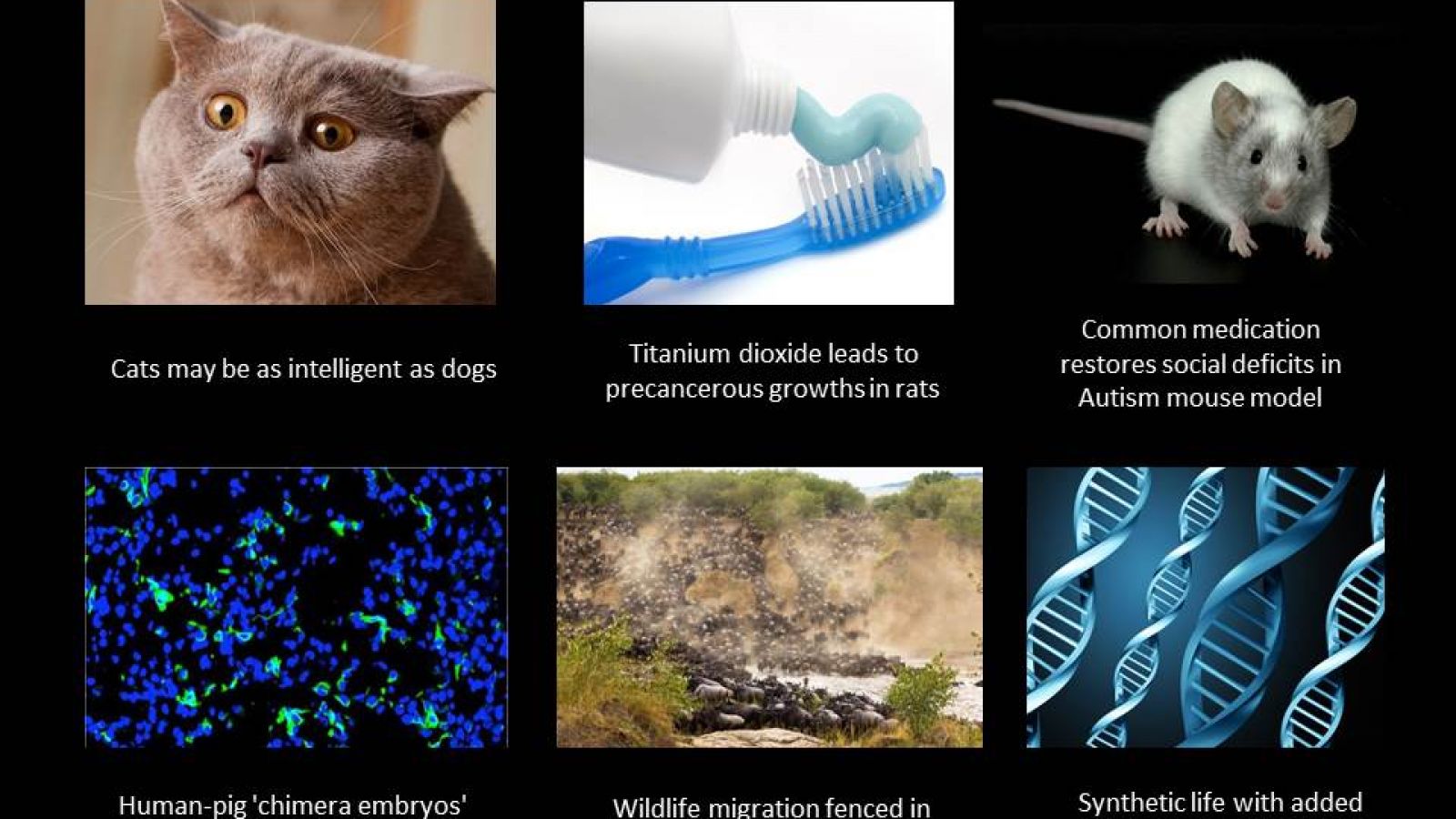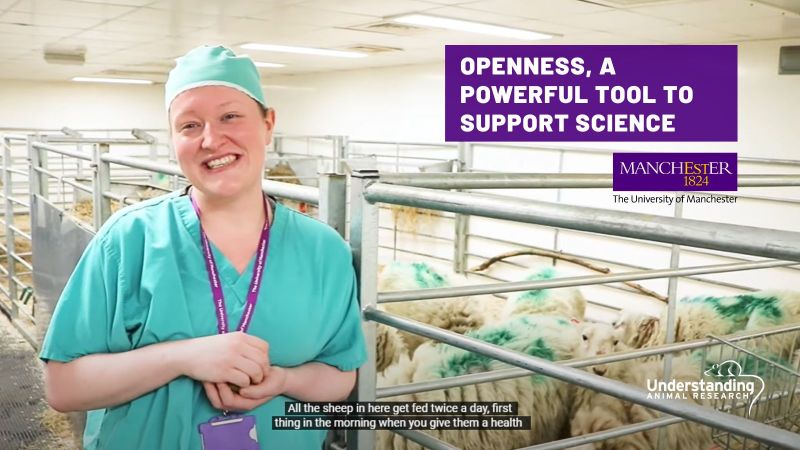 Hybrid zoo: Introducing pig–human embryos and a rat–mouse
Hybrid zoo: Introducing pig–human embryos and a rat–mouse
Chimaeras could pave the way for growing human organs in other animals.
http://www.nature.com/news/hybrid-zoo-introducing-pig-human-embryos-and-a-rat-mouse-1.21378
It is the first proof chimeras - named after the mythical lion-goat-serpent monster - can be made by combining material from humans and animals.
However, the scientific report in the journal Cell shows the process is challenging and the aim of growing human organs in animals is distant.
The embryo - now a mix of human and pig - is then implanted into a sow for up to one month.
http://www.bbc.co.uk/news/health-38717930
UAR leading the way in openness
This article by Lev Tanelevitch looks at how Understanding Animal Research are leading the world in animal research openness. It notes how the Concordat on Openness is playing a key role in fostering a spirit of transparency and encouraging proactive communications about animal research by institutions.
http://blogs.nature.com/naturejobs/2017/01/20/defending-science-by-opening-up-lessons-from-understanding-animal-research/
Moth larvae could reduce studies on mammals
A study funded by the NC3Rs believes that certain tests currently conducted on mammals could be done on moth larvae. Since moths are invertebrate they are not able to suffer in the way mammals and other vertebrate species are - so such a move could improve animal welfare overall.
http://www.bournemouthecho.co.uk/news/national/15040458.Moth_larvae__cuts_number_of_mammals_needed_for_animal_tests_by_up_to_80__/
Toothpaste, Cancer and Rats
A study in rats found that the additive titanium dioxide, found in toothpaste, caused an increased proportion of precancerous growth in rats. E171 is found in a number of other products including sweets and sunscreen. It is unclear whether the levels found in products such as toothpaste are dangerous, or indeed if the chemical poses any risk to humans.
In a joint statement, the French ministries for the economy, health and agriculture said:
“A study carried out by the National Institute for Agricultural Research (INRA) and published today shows that oral exposure to titanium dioxide (E171), the additive used particularly in the agri-food industry, is likely to result in effects on health. However, at this stage, the results of the study do not make it possible to extrapolate to humans.
http://www.independent.co.uk/news/science/toothpaste-additive-e171-titanium-dioxide-food-products-cancer-cause-scientists-a7541956.html
Synthetic life with added DNA bases
Floyd Romesberg and his team at the Scripps Research Institute in California expanded the genetic code from four letters to six by adding two new molecules they call X and Y and adding them to E. coli’s genetic makeup. The microbes are modified to absorb the new genetic material which the scientists make separately and then feed to the cells.
The need to supply the bugs with the X and Y molecules is meant to ensure that the cells will die should they somehow get out of the lab.
https://www.theguardian.com/science/2017/jan/23/organisms-created-with-synthetic-dna-pave-way-for-new-entirely-new-life-forms
Wildlife migration fenced in
The Mara ecosystem is home to the largest number of Savannah species in the world, including wildebeests, zebras, elephants, lions, and giraffes. All of them are entirely dependent on being able to roam the landscape in search of food and water.
But in recent years, an effective barrier has been thrown up: fences.
In a new study, researchers examine the negative impacts of fencing on wildlife migration—and it’s not looking good.
“From an ecological perspective, it’s a huge tragedy. The open grasslands are becoming smaller and smaller and one of the world’s largest animal migrations is being blocked right now,” says Assistant Professor Mette Løvschal from Aarhus University, Denmark. She is the lead-author on the study, which is published in Scientific Reports.
http://sciencenordic.com/fences-are-disrupting-african-wildlife-unprecedented-scale
Cats may be as intelligent as dogs
Saho Takagi, a psychologist at Kyoto University, said cats, as well as dogs, used memories of a single past experience, which may imply they have episodic memory similar to that of humans.
"Episodic memory is viewed as being related to introspective function of the mind; our study may imply a type of consciousness in cats," she told BBC News.
"An interesting speculation is that they may enjoy actively recalling memories of their experience like humans."
The Japanese team tested 49 domestic cats on their ability to remember which bowl they had already eaten out of and which remained untouched, after a 15-minute interval.
http://www.bbc.co.uk/news/science-environment-38665057
A Common Medication Restores Social Deficits in Autism Mouse Model
Reducing the function of the autism-associated gene Pcdh10 leads to impairments in social behavior, according to a study published in Biological Psychiatry. Reducing Pcdh10 function also disrupted the structure and function of circuitry in the amygdala, a brain region implicated in the behavior symptoms of autism spectrum disorder (ASD).
In the study, first authors Dr. Hannah Schoch and Dr. Arati Kreibich, both of the University of Pennsylvania, and colleagues found that neurons in the amygdala of mice lacking one copy of Pcdh10 (Pcdh10+/-) had reduced levels of NMDA glutamate receptor subunits, indicating disrupted excitatory neural circuitry.
“Our study of Pcdh10+/- mice gives us greater insight into the biology of social behaviors and into the function of a gene associated with ASD,” said senior author Professor Edward Brodkin, also of the University of Pennsylvania.
http://dx.doi.org/10.1016/j.biopsych.2016.06.008
Last edited: 7 April 2022 14:52




